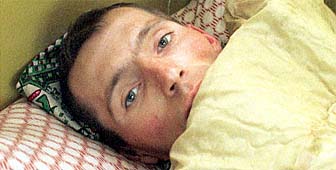Swiss scientists move closer towards developing HIV vaccine

Scientists in Lausanne have discovered why killer cells of the immune system fail to control the spread of HIV. The breakthrough could be a significant step towards developing a vaccine against the virus, which causes Aids.
Immunologists at the University Hospital (CHUV) said the killer cells of the immune system – called CD8 T Lymphocytes – are ineffective against HIV-infected cells because they have not fully matured.
They said this explained why virus replication could not be controlled in HIV-infected patients despite the fact that they had a large number of CD8 cells.
The discovery holds out the possibility that by developing a vaccine which generates mature killer cells, the virus could be prevented from replicating.
“We know that HIV stimulates a large immune response but it is not very effective,” said Giuseppe Pantaleo, head of the immunology and allergy division. “We can now investigate how to get these cells to a state of maturity where they will be able to kill virus-infected cells efficiently.”
We also understand why the virus comes back, when patients interrupt anti-retro viral (ARV) therapy. Although ARV drugs are extremely effective in controlling virus replication, the immune system is not able to control the infection when therapy is interrupted.”
ARV drugs are only used for a limited period, partly because of the impact they have on the lifestyle of the patient and partly because of their long-term toxicity.
Having different populations of killer cells has significant implications for vaccine development, said Pantaleo. “Some of them are able to kill, some of them are not. To have an effective vaccine, we need to develop immunisation strategies which are going to generate mature killer cells.”
The work in Lausanne is part of an European initiative to bring HIV vaccines to clinical trial. In 2002, several candidate vaccines, which are both preventative and therapeutic, will be tested in healthy volunteers and in patients with chronic infection.
Pantaleo said he was optimistic about the chances of success. “I think that within two or three years, we should be able to control more and more cases of chronic infection with some sort of immune-based intervention.
“If we identify an infection very early, we know already that ARV therapy preserves the immune response. When the patient stops therapy, there is the possibility that the immune system can control the infection. We need to find a way to reconstitute some effective immune responses among patients with chronic infections.
“The goal of intervention in HIV infection is not necessarily to eradicate the virus, which is virtually impossible, but rather to keep the virus replication at such low levels that it is never able to cause disease.”
by Vincent Landon

In compliance with the JTI standards
More: SWI swissinfo.ch certified by the Journalism Trust Initiative
You can find an overview of ongoing debates with our journalists here . Please join us!
If you want to start a conversation about a topic raised in this article or want to report factual errors, email us at english@swissinfo.ch.